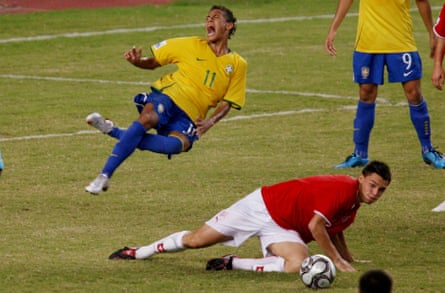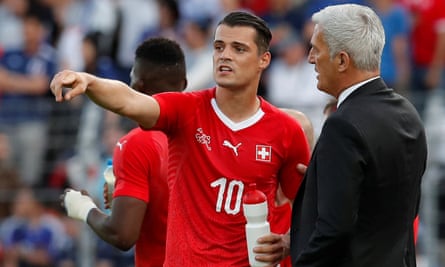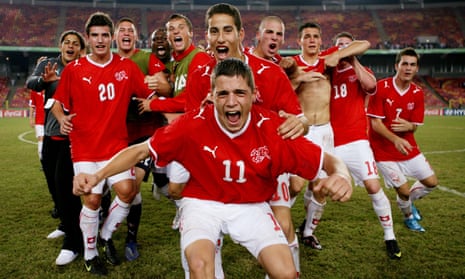Granit Xhaka’s first brush with Neymar was light yet memorable. “It did not take much for him to go down, even the slightest touch was enough – that’s how I remember him,” the Switzerland and Arsenal midfielder says. The confrontation took place at the Under-17 World Cup in 2009, when Xhaka’s team faced Neymar’s Brazil in their final group-phase match, and it was a direct one. Xhaka started at right midfield; Neymar on the left.
Switzerland were assured of going through, having won both their previous games, but Brazil needed at least a draw. They did not get it. Switzerland prevailed by the only goal, scored by Nassim Ben Khalifa – now of St Gallen – following a corner from Xhaka and the result provided the springboard to glory.
Xhaka and a lineup that featured the left-back Ricardo Rodriguez (now at Milan), the Sion midfielder Pajtim Kasami and the Benfica striker Haris Seferovic would beat Germany, Italy and Colombia to set up a meeting with the hosts, Nigeria, in the final. They won 1-0, courtesy of a Seferovic goal.
Brazil’s exit was early and ignominious, particularly as their team also included the future Roma goalkeeper Alisson, the Real Madrid midfielder Casemiro and the Barcelona playmaker Philippe Coutinho. There was the usual paroxysm of melodrama and soul-searching when they got home before the Brazilian public and media moved on to the next thing.
For Xhaka the events of 2009 provide the backstory to Switzerland’s World Cup opener against Brazil in Rostov on Sunday night, along with a couple of lessons. “The main one I learned was that in football everything is possible,” the 25-year-old says.
Xhaka’s recollections are crystal clear, down to the detail of the anticipation that he and his roommate, Rodriguez, felt on the eve of the Brazil tie. Back then the dream had been to face Brazil at a senior World Cup. That is now upon them.
“It’s the standard dream of every kid because Brazil is always the one that you want to beat,” Xhaka says. “Before we played them in 2009 there was so much excitement. I remember that Neymar, Coutinho and Casemiro played. Casemiro was already really muscular – a bull type, as he is today. I thought: ‘This is an incredible opportunity for me and the whole team.’”
Xhaka’s comments about Neymar sound provocative but to him they are merely statements of fact. He has never been a guy to pull his punches. “I just remember that he fell down very often and very lightly,” Xhaka says. “What can I say? That was the reality. It’s how it was in that game.
“Neymar is a world-class player who can decide matches and I wish him all the best. I actually hope to meet up with him after the game in Rostov to swap shirts. We didn’t swap shirts in 2009. We needed ours for the next match.”

Neymar was ineffective against Switzerland back then and he was substituted after 69 minutes. Coutinho, though, was another story. “What a player he was – he was a completely different class,” Xhaka says. “There was absolutely no comparison between Neymar’s performance and Coutinho’s performance. Coutinho was a constant danger.
“I don’t know if Coutinho would remember it but I’ll remember that performance for the rest of my life. I knew right then that Coutinho would go on to become a full international, even if he was a shyer type than Neymar. I could see that Neymar was one of the big characters in the team and a lot of players looked up to him.”
Xhaka faced Neymar and Brazil in a senior friendly in August 2013, which Switzerland won 1-0 in Basel, and he and the squad have come to boast sureness and cohesion. The manager, Vladimir Petkovic, has pretty much retained the starting XI that reached the last 16 at Euro 2016 and there is the belief that this can be the tournament in which Switzerland reach the quarter-finals for the first time since 1954. In Brazil four years ago – when Xhaka started every game under Ottmar Hitzfeld – they suffered a 1-0 extra‑time defeat by Argentina in the last 16.
“Everybody knows the history of 1954 but a lot of my teammates – and me, especially – think that 2018 might be the year when we equal or even better it,” Xhaka says. “The main thing at these tournaments is that you have to be ruthless. You don’t have 10 chances. You have one and you have to score.
“Brazil’s reputation is not really of any importance. They are an opponent and we want to beat them. I hope and think that they might underestimate us. That’s a big asset we have. We are a real underdog against them.”
Xhaka wears his youth World Cup crown lightly. He describes the triumph as a “big step” in his career but not the defining one in terms of becoming a top professional. That said, it is a rich crop when an under‑17 team supplies three key players for a World Cup campaign – Xhaka, Rodriguez and Seferovic. Kasami is also a full international but he is not in Petkovic’s squad.

“Four [internationals] is a lot because we are talking about under-17 level,” Xhaka says. “From this generation quite a few others became professionals, although they are not at the highest level. Most of them play in Switzerland.”
Xhaka does not want to get ahead of himself because Switzerland’s group in Russia is tough. After Brazil they face Serbia and Costa Rica. But he does see another parallel to the Under-17 World Cup success, a further good omen. “We played Germany in the last 16 in 2009 and the same thing can happen at this World Cup,” Xhaka says.
That Germany team featured his now Arsenal colleague Shkodran Mustafi, together with the Barcelona goalkeeper Marc-André ter Stegen and the Borussia Dortmund midfielder Mario Götze. Earlier in 2009 Germany had won the European Under-17 Championship and they were the favourites to progress. Instead Switzerland stunned them 4-3 after extra time.
“We were never ever looking forward to a game as much as that Germany one,” Xhaka says. Until now, that is. He and Switzerland have their eyes on another upset.
